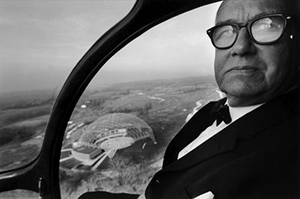

He has been described as a polymath, genius, crank, visionary, and brilliant inventor mostly known for dedicating his life to finding out what one human being could do in benefit of all humankind. His mathematical ideas of design science helped lead to the realization that we are now doing more and more with less and less, a process he called 'ephemeralization.' Moreover, he rationally speculated that post-scarcity material abundance itself could become commonplace if we were willing to apply the scientific method to our social and political-economic systems.
Buckminster Fuller (1895-1983) turned to nature at an early age to understand how to mirror what he saw as efficiency in design and elegance.
Although kicked out of Harvard twice, Fuller went on to excel in preventing shipwreck fatalities in the Navy. After an epiphany when his first-born daughter died during a poverty-stricken phase, he decided to spend his entire life experimenting with what one person could do, that neither governments or corporations could, to benefit all of humanity.
Fuller went on to develop emergency shelters capable of withstanding extreme environments, revolutionize low-cost housing (he designed a house with modern conveniences for the present-day cost of $1,800 to build), and transportation.
He developed his own architectural language to explain factors in polyhedron structures such as "tensegrity" for the equally-proportional tension at each end, resulting in structural integrity. He called his overall mathematical philosophy 'synergetics.'
He once embarked upon a year-long experiment of not speaking.
He was also an early systems-theorist concerned with long-term human sustainability. He felt that the profit motive itself was inefficient in the allocation of life-sustaining resources on-board what he liked to call Spaceship Earth. Moreover, he concluded that the best course of action to take for the long-term human project was to benefit everyone without disadvantaging anyone.
Speaking to Fuller, Albert Einstein said, "Young man, you amaze me."
These are some of the basics.
For a further in-depth biography and breakdown of the most important points in Buckminster Fuller's life, visit his Wikipedia article: